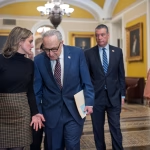Angela Rayner’s resignation as Deputy Prime Minister and Housing Secretary has not only rocked Westminster but also slashed her annual income by six figures.
What Happened and Why It Matters
Rayner, long seen as one of Labour’s most high-profile figures, had been holding two of the most senior jobs in government—Deputy Prime Minister and Housing Secretary. But after weeks of negative headlines and growing questions around her handling of the stamp duty row, she confirmed she would be stepping down from both roles, retreating to the backbenches as a standard MP.
While the political ramifications are still unfolding, the financial cost of this decision is immediate and stark.

Angela Rayner and Chancellor Rachel Reeves side by side in Parliament, reflecting Labour’s frontbench unity.
The Salary Difference
Before resigning, Rayner drew a significant package as part of her cabinet responsibilities. According to The Times, her combined annual income came to around £227,089. This figure included her Deputy Prime Minister’s salary, estimated at £159,584, alongside an additional £67,505 paid for her role as Housing Secretary.
Now, with both of those roles relinquished, Rayner falls back to the basic Member of Parliament’s salary, which stands at roughly £93,904 per year according to Parliament News. That means she faces an immediate annual loss of £133,185.
The Long-Term Financial Impact
The short-term hit is significant, but the real cost comes when the lost salary is projected across the remainder of Labour’s term in office. Under current electoral rules, the next general election must be held no later than 15 August 2029, which gives the Labour government about four more years in power from this point in September 2025.
If Rayner had remained in post, she could have expected to earn her ministerial salaries throughout this period. Instead, over the four years until the next election, she is set to lose out on approximately £532,740 in total income.

Angela Rayner in a candid interview, addressing questions with a serious and thoughtful demeanor.
People Also Ask
Does Angela Rayner still receive ministerial perks after resigning?
No. Once a minister resigns, they lose entitlement to ministerial perks such as official cars, additional staff support, and enhanced salaries. She now receives only the standard MP benefits package.
Will Angela Rayner’s pension be affected by stepping down?
Her parliamentary pension remains unaffected. However, ministerial pensions are partly based on time served, so her early exit means she will accrue less in this area compared to a full term.
Could Angela Rayner return to the Cabinet before the next election?
Yes. Resignations do not prevent future appointments. If Keir Starmer were to reshuffle or if circumstances changed, she could be invited back to a senior role before 2029.
Is Angela Rayner still Deputy Leader of the Labour Party?
No. Angela Rayner resigned not only from her government roles but also from her position as Deputy Leader of the Labour Party. The office is now vacant as of September 5, 2025.

Angela Rayner walks alongside Labour leader Sir Keir Starmer, backed her amid the stamp duty controversy.
More Than Just Money
While the financial blow is obvious, the broader cost to Rayner’s political influence may prove even greater. As Deputy Prime Minister, she was second in command to Keir Starmer and a powerful figure in Labour’s future strategy. Her departure from cabinet sidelines her at a crucial time in government, reducing not only her income but also her influence in shaping the direction of the country.
In my view, much of this feels like a witch hunt against a working-class woman that many in the establishment were eager to see fail. Yes, Rayner made mistakes and should have been more careful, but the outrage seems disproportionate. To frame this as if it were on the same scale as the multi-million-pound scandals and questionable deals that surfaced under successive Conservative governments is baffling. The imbalance in how political figures are scrutinized reveals more about power dynamics than about the infraction itself.














